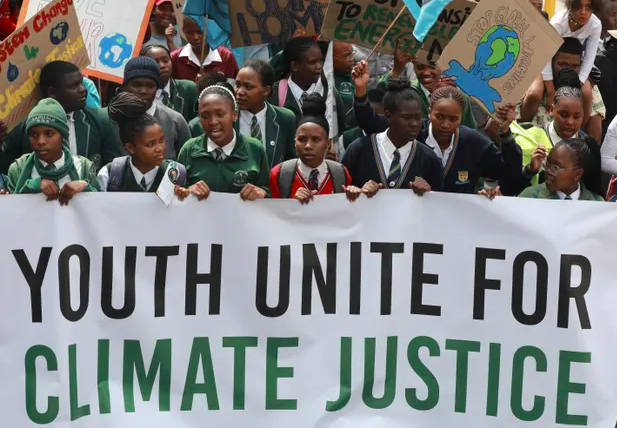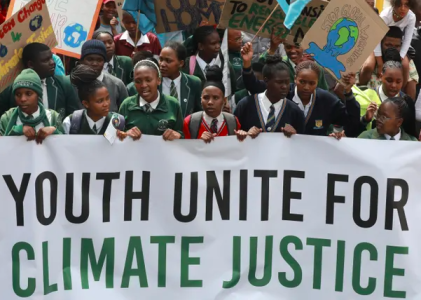Dear readers,
it is awfully hot this year in Malawi and though my biggest fear right now may be a sunburn, many Malawians are scared about an extremely dry season, floods, and therefore a bad harvest. The soil is cracking, dry, and hard as stone, and the rainy season is still some months ahead of us.
I know you feel for the people in Malawi (empathy is a beautiful thing isn’t it) but you might also ask yourself what this heat and drought have to do with online activism. In the case of the United Nations Climate Change Conference 27, it unfortunately has everything to do with online activism.
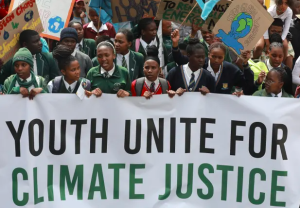
COP 27 is called the African Cop not only because it will take place in Egypt which obviously is Africa, but also because African countries are highly affected by Climate Change. It is no surprise that many organisations (grassroots as much as bigger ones) aim to be part of the discussions during the COP. Sounds good in theory, doesn’t it? Well, sadly it’s in theory only. First of all Egypt’s government like in many other African countries is standing on shaky pillars, far from what is considered to be a stable democracy according to western standards. It is therefore no surprise, that protests are banned in Egypt and many activists fear promises made by the government to allow protests will turn out empty. Another reason why it only sounds good in theory is because the reality for many African climate activists looks very different. Weeks before the actual conference, I stumbled over an article by the Guardian with the worrisome title:”‘I have a voice’: African activists struggle to attend UN climate talks in Egypt.
“Yet just over 20% of grassroots activists have secured accreditation, and only a handful have funding to cover expenses such as travel, accommodation, and visas, according to a coalition of African youth climate leaders. With just over a month to go before negotiations open and affordable hotels in short supply, the coalition, which includes the youth groups Fridays for Futures and Riseup in Africa, conducted the survey to review progress.” (Guardian)
For many young African climate activists attending the COP in person will be a dream put on hold this year. But let’s be honest, it was the same story last year for many activists based in Africa and if things aren’t drastically changing, it will be the same situation next year. As much as this sounds frustrating and is highly unfair it highlights the enormous importance of online activism for the African Youth.
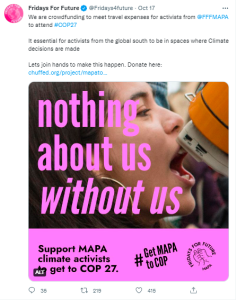
The Coca-Cola sponsorship of the COP27
When Egypt announced Coca-Cola (alias plastic polluter and water waster number 1) as the official sponsor of the COP27 outrage amongst young climate activists in Africa (and all over the world) was enormous. Twitter blew up with tweets about greenwashing, petitions, and podcasts on how disturbing such a sponsorship would be.
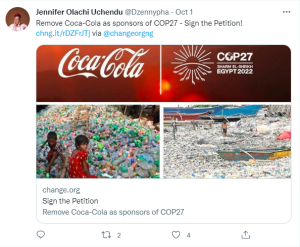
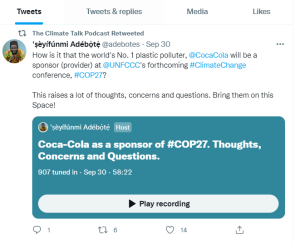
Find Jennifer’s tweet here and listen to The Climate Talks Podcast here
In case some of you are now inspired to start a social media campaign around the COP here is an interesting read on how to do it 🙂
But what about Malawi?
I know some of you were wondering what my friend Simeon (if the name doesn’t ring a bell make sure to read my last blog here) is doing about the COP. I shall not leave you in the dark. He is currently supporting a Malawian Youth and Children Climate Justice Caravan to raise awareness towards the COP and to cycle for children’s rights in Malawi. Because as exciting as the COP itself is, there is the first-ever National children’s summit on climate change happening in Malawi right now! But this is a topic for another blog 😉
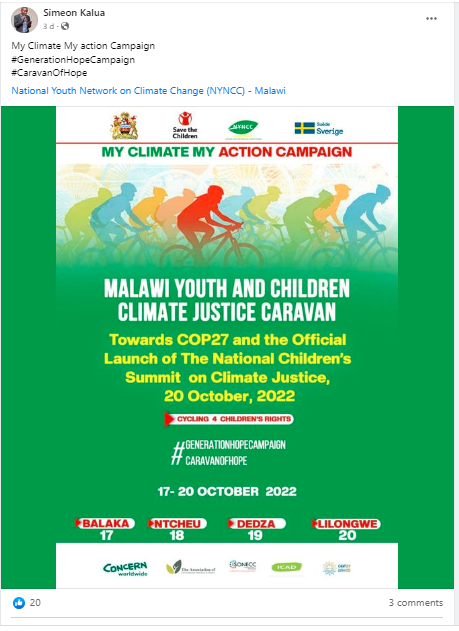
As much as he isn’t the founder of the campaign he is a big supporter.
Let me know what you’re thinking about the underrepresentation of African Youth at the COP27 (or shall I say COP in general?) and what potential you see in digital activism. Also, don’t forget to sign the petition against Coca-Cola becoming the sponsor of this year’s COP here.
Thank you very much for reading to the end and I look forward to lively discussions directly on the post’s “Comments” section as well as on Facebook and Twitter. What do you think it terms of the COP27 being Africa’s? Is Africa’s Youth underrepresented at the COP27? And what is something you feel was missing in the analysis? I’m eager to know and to broaden my horizons. Thank you in advance for the engagement!
“Read” you next time!
